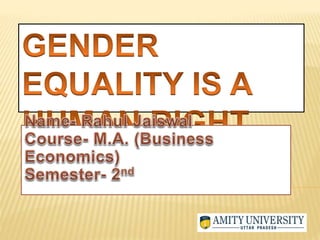Gender equality is a human right
- 2. It is the vision that men and women should be treated equally in social, economic and all other aspects of society, and to not be discriminated against on the basis of their gender. Gender equality is one of the objectives of the united nations universal declaration of human rights.
- 3. ’āÆ Article 14- equal rights and opportunities for men and women in the political, economic and social sphere ’āÆ Article 15- prohibition of discrimination on the grounds of sex, religion, caste etc ’āÆ Article 15(3) - empowers the State to take affirmative measures for women ’āÆ Article 16- provides for equality of opportunities in the matter of public appointments
- 4. The Labour Laws for Empowerment of Women ’āÆ Equal Remuneration Act, 1976 ensures equal opportunity, equal treatment and equal wages. ’āÆ Maternity Benefit Act, 1961 provides 90 days paid leave for working women ’āÆ The Factories Act, 1948 ŌĆō Section 34 provides that the State government can lay down rules prescribing weights that may be carried by men and women. ’āÆ The Contract Labour (Abolition and Regulation) Act and Rules- separate provision of utilities for women and fixed working hours. ’āÆ Women in the unorganized sector donŌĆÖt get benefits of the labour laws in spite UNORGANISED WORKERS' SOCIAL SECURITY. ACT, 2008. N0. 33 OF 2008.
- 5. The informal sector as opposed to the formal sector is often loosely defined as one in which workers do not have recognition as workers and work without any social protection. In the informal sector, women workers are forced to work without contracts, without social security, with low wages under bad working conditions. In the absence of health insurance, income security, it is difficult for women workers in informal sector to place importance on their health. The lack of income security often has direct consequence on the access to education for the children of women workers in informal sector. They are not able to study and alleviate their poverty. Often children get absorbed into the informal sector themselves as adults due to lack of education or as children to help adults earn more (e.g. home based workers, vendors, self employed)3 A Case Study of Women Rag Pickers in Mumbai Unorganised labour is usually perceived as ŌĆśpoorŌĆÖ and as a beneficiary, consequently there are provisions in the national budgets to help them out of their poverty and vulnerability. They are treated as beneficiaries of anti- poverty programs. The main concern of informal sector workers is irregular employment (Patel & Karne, 2006).
- 8. Thank You








